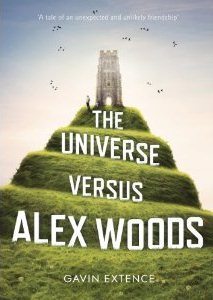You have no items in your cart. Want to get some nice things?
Go shopping Meet Alex Woods. He’s seventeen years old and sitting at the wheel of Mr Peterson’s car at Dover after a hasty round trip to Zurich. A customs controller has just shone a torch on the passenger seat, only to find an urn containing the remains of said car’s owner. Alex has a minor epileptic fit, declares himself unfit to drive, and then sits silently conjugating irregular Spanish verbs while he waits to be interrogated by the police. When he is called in for questioning, he calmly admits to cultivating the one hundred and thirteen grams of marijuana that have been found in the car’s glove pocket.
Meet Alex Woods. He’s seventeen years old and sitting at the wheel of Mr Peterson’s car at Dover after a hasty round trip to Zurich. A customs controller has just shone a torch on the passenger seat, only to find an urn containing the remains of said car’s owner. Alex has a minor epileptic fit, declares himself unfit to drive, and then sits silently conjugating irregular Spanish verbs while he waits to be interrogated by the police. When he is called in for questioning, he calmly admits to cultivating the one hundred and thirteen grams of marijuana that have been found in the car’s glove pocket.
If it sounds like I’ve given too much away already, don’t worry. This might be the end of Alex’s story, but it’s also the beginning of the book. He then moves back in time to explain how and why he has ended up in such a sticky situation. The police just want “something that will fit neatly in a box on a police statement form”, but Alex wants to tell his full story, the way it should be told. The first chapter ends with a warning: “You might want to put the kettle on or fetch some more cushions. It’s not going to be brief.”
You certainly couldn’t describe The Universe vs. Alex Woods as brief, but Alex’s teenage voice is so brilliantly honest and effortless that this long coming-of-age tale feels strangely nimble. And, despite having a pretty good idea of what is going to happen, it’s hard not to be deeply affected by Gavin Extence’s warm, witty story of an odd teenager struggling with growing up, friendship, morality, and a heartbreaking dilemma.
From early on, it’s clear that Alex himself is in control of his story — no obscure first-person narrator here, thank you. And in this, Extence shines a light on the very nature of storytelling, the way that only one character can really guide the pace and direction of a story. Narrative pointers are scattered through the text, as are philosophical musings on life itself as a kind of story. There is nothing awkward, then, in Alex pointing out to the reader what they should pay particular attention to.
Pivotal moment no. 1 occurs when, aged ten, Alex is hit by a meteorite while standing in the bathroom of the house he shares with his tarot-card-reading mother. Unfortunately, he notes, “she didn’t realize that she’d foreseen the entire catastrophe until after it had happened”.
Pivotal moment no. 2 happens on his way to feed the ducklings. Carrying bread and the latest edition of the Sky at Night magazine, Alex is set upon by the school bullies. After hiding in a shed, he ends up taking the blame for the greenhouse the bullies smash in place of him. The greenhouse belongs to Mr Peterson, an irascible widower and Vietnam veteran, and an unlikely friendship develops that becomes both a source of great humour and sorrow.
Much of the wit of The Universe Versus Alex Woods derives from our protagonist’s deadpan narrative voice. Both logical and naive, Alex is inadvertently funny and, like the narrator of Mark Haddon’s A Curious Incident of a Dog in the Night-Time, needs to explain everything in great detail. Appalled to think that his handshake might have been on the limp side when meeting the curator of the National History Museum, Alex grips him tightly on departing, so as not to “leave any doubt that the morning’s handshake had been an anomaly”. Likewise, it’s impossible to keep a straight face when he describes a conversation with an irritable Swiss hotel clerk in which Alex insists on speaking in his newly acquired German — “His slightly edgy disposition I put down to my over-zealous war-film accent.” Beneath this humour, though, lies unexpected emotional depth. So fluently entertaining and unflinching is Extence’s writing that it almost comes as a surprise to realise how moving Alex’s story really is.
The Universe Versus Alex Woods is built on brilliant characterisation, humour and emotional sincerity, cemented by philosophical mettle. Through his friendship with Mr Peterson, Alex learns about the importance of kindness, truth and humanity. The writings of Kurt Vonnegut provide a framework for these discussions of atheism, free will, humanism and politics, and the novel is peppered with extracts from his work. The detailed explanations of philosophical ideas might grate on some readers, but Extence never loses sight of the beating heart and raw emotions of his novel. He deals with a difficult, shadowy subject — one that lurks in the darkest corners of many people’s minds — and he does so thoughtfully and tenderly.
The novel is not without its faults. For all its witty phrasing and original characters, it sometimes feels a little aimless. We don’t arrive at the meat of the story for a long time, held back by a long preamble. But this is all splitting hairs. The Universe Versus Alex Woods is a very impressive debut novel. With writing that is logical yet lyrical, comic yet compassionate, Gavin Extence has revealed the simple beauty of laughter, friendship, love and reason.

About Bella Bosworth
Bella Whittington reads and reviews a bit of everything, but is particularly interested in literary fiction, translations and short stories. After living in Spain for a year, she now works as an assistant editor for Transworld Publishers in London. She has also contributed to Thresholds, the University of Chichester's international short story forum, and the Harker.





Oh, glad to see Universe Versus Alex Woods on @Desmond_Elliott shortlist. I reviewed it back when for @LitroMagazine https://t.co/1tAngtB7p3